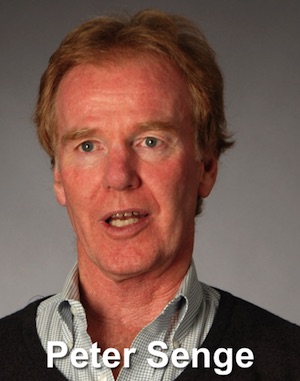If business strategy is the search for competitive advantage, then the Journal of Business Strategy would seemed to have endorsed one strategy above all others. In naming Peter Senge as their ‘Strategist of the Century’ they implicitly set his concept of The Learning Organisation on a strategic pedestal. Indeed, they described Senge as someone who ‘had the greatest impact on the way we conduct business today’.

Short Biography
Peter Senge was born in California, in 1947. He attended his local university, Stanford, where he earned a BS in Engineering. He moved to MIT where he studied Social Systems Modelling for his MS, followed by a move to the MIT Sloan School of Management in 1970, where he gained a PhD in management that he completed in 1978. He stayed on, continuing his research into how we learn, within organisations.
His research culminated in his best-selling synthesis of these ideas, ‘The Fifth Discipline: The art and practice of the learning organization‘. This book has been rated by Harvard Business Review as one of the seminal management books.
His subsequent work has built on this theme:
- publication of ‘The Fifth Discipline Fieldbook: Strategies for Building a Learning Organization‘ in 1994 and
- ‘The Dance of Change: The Challenges of Sustaining Momentum in Learning Organizations‘ in 1999, and
- the foundation of the Centre for Organizational Learning – now Society for Organizational Learning – a non-profit member organization pursuing development of people and institutions.
What is The Learning Organisation?
The learning organisation is one that encourages continued learning for both groups and individuals, as a source of competitive advantage. People at all levels from shop floor to senior management will be continually developing their skill levels, knowledge and experience. It is like building an institutional ‘growth mindset’ by increasing the creative capacity.
When Senge published The Fifth Discipline in 1990, the ideas were not new. Indeed, Senge acknowledges his debts, especially to Chris Argyris, and his 1978 book ‘On Organizational Learning‘; and to Arie de Geus. The term “Learning Organization’, which Senge has made his own, was coined in 1987 by Bob Garratt, in his book ‘The Learning Organization and the Need for Directors Who Think‘.
In The Fifth Discipline, Senge describes five core components of personal development. This book is often viewed as highly theoretical, so his follow-up Fifth Discipline Fieldbook set out practical answers to the questions he received about ‘how’ to implement these ideas.
The five means of development, that create a Learning Organization, are:
- Personal Mastery
Individual, continuous, life-long learning. Senge also emphasises the importance of spiritual development. This, he argues, allows us to understand the tension between reality and vision. He suggests this is the source of creativity. - Mental Models
Senge suggests that we carry implicit mental models of our world and our organizations. We need to understand and challenge them. In the Fieldbook, he offers the tool of a ladder of inference, that climbs up from observation of data, to selection of the data, to applying meanings to them, to making assumptions, from which we draw conclusions, from which we adopt beliefs, that drive our choices of actions. This process helps us to analyse our values, beliefs and actions. - Shared Vision
When team members create a vision that they share and jointly own, this brings them together, serves as a basis for creativity, and readies them for change. - Team Learning
Senge believes that group development will outpace individual development in driving team performance. He also distinguishes between dialogue (an exploratory process) and discussion (a process for narrowing and selecting from options). - Systems Thinking
This is the ‘fifth discipline’. It requires us to see an organization as an inter-connected whole, with a complex set of inter-relationships. Processes do not work as simple chains of cause and effect, but as complex interacting feedback loops that reinforce or counteract each other.




